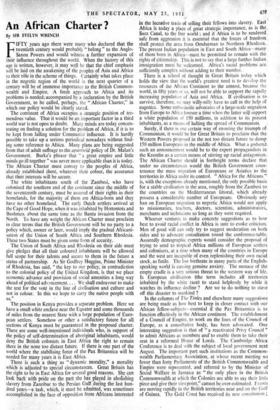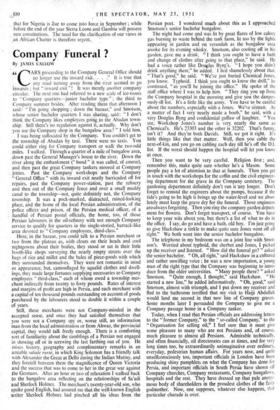An African Charter ?
By SIR EVELYN WRENCH
FIFTY years ago there were many who declared that the twentieth century would probably ' belong " to the Anglo- Saxon Powers and would witness a further expansion of their influence throughout the world. When the history of this age is written, however, it may well be that the chief emphasis will be laid on the awakening of the peoples of Asia and Africa to their role in the scheme of things. Certainly what takes place in the negretic region of the world in the next quarter of a century will be of immense importance to the British Common- wealth and Empire. A fresh approach to Africa and its problems is needed;accompartied by a declaration by the British Government, to be called, perhaps, the "African Charter," in which our policy would be clearly stated.
The continent of Africa occupies a strategic position of tre- mendous value. That it would be an important factor in a third world war is not open to doubt. Many minds are today concen- trating on finding a solution for the problem of Africa. if it is to be kept from falling under Communist- influence. It is hardly possible to take up a serious periodical nowadays without find- ing some reference to Africa. Many plans are being suggested from that of adult suffrage to-the apartheid policy of Dr. Malan's Government. Burke's phrase that "a great empire and little minds go ill together" was never more applicable than it is today. The African Charter must convey to the peoples of Africa, already established there, whatever their colour, the assurance that their interests will be secure.
The white inhabitants south of the Zambesi, who. have colonised the southern end of the continent since the middle of the seventeenth century, must be assured of their rights in their homelands, for the majority of them are Africa-born and they have no other homeland. The early Dutch settlers arrived at the Cape of Good Hope, when it was inhabited by Hottentots and Bushmen, about the same time as the Bantu invasion from the North. To have any weight the African Charter must proclaim in clear terms that the British Government will be no party to a policy which, sooner or later, would imply the gradual Africani- sation of the Union of South Africa and Southern Rhodesia. These two States must be given some form of security.
The Union of South Africa and Rhodesia on their side must give pledges that all their coloured inhabitants will be allowed full scope for their talents and secure to them in the future a status of partnership. As Sir Godfrey Huggins, Prime Minister of Rhodesia, has said, "the key to our policy, in contradiction to the colonial policy of the United Kingdom, is that we place economic advance and provision of social amenities a long way ahead of political advancement.... We shall endeavour to make the test for the vote in the line of civilisation and culture and not in colour. In this we hope to carry the native people with us."
The position in Kenya provides a separate problem. Here we have a small white enclave near the Equator and some thousands of miles from the nearest State with a large population of Euro- pean settlers. Somehow or other a satisfactory future for all sections of Kenya must be guaranteed in the proposed charter. There are some well-intentioned individuals who, in support of the policy of self-determination of aboriginal inhabitants, would deny the British colonists in East Africa the right to remain there in the none too distant future. If there is one part of the world where the stabilising force of the Pax Britannica will be needed for many years it is East Africa. There is such a thing as "dynamic morality," a morality which is adjusted' to special circumstances. Great Britain has the right to be in East Africa for several good reasons. She can look back with pride on the part she has played in abolishing slavery from Zanzibar to the Persian Gulf during the last hun- dred years—a task, which, it must be admitted, was sometimes accomplished in the face of opposition from Africans interested in the lucrative trade of selling their fellows into slavery. East ' Africa is today a place of great strategic importance, as is the Suez Canal, to the free world ; and if Africa is to be rendered safe from aggression it is essential that the forces of freedom. shall protect the area from Omdurman to Northern Rhodesia.. The present Indian population in East and South Africa—many of them born in Africa—must be permitted to remain with the rights of citizenship. This is not to say that a large further Indian immigration must be welcomed. Africa's racial problems are . sufficiently complex without adding to their number. There is a school of thought in Great Britain today which holds the view that the world's greatest need is to dewlop the resources of the African Continent to the utmost, because the world, in fifty years or so, will not be able to support the rapidly increasing population of Asia and Africa. If civilisation is to survive, therefore, we may willy-nilly have to call in the help of eugenics. Some enthusiastic advocates of a large-scale migration from Europe to Africa foresee a time when the latter wiU support a white population of 150 millions, in addition to its present inhabitants, as a means of halting the spread of Communism.
Surely, if there is one certain way of ensuring the triumph of. Communism, it would be for Great Britain to proclaim that the Western Powers proposed in the not too distant future to dump 150 million Europeans in the middle of Africa. What a godsend' such an announcement would be to the expert propagandists in the Kremlin as a certain means of stirring up racial antagonism.. The African Charter should in forthright terms declare that. under no circumstances would the British Government coun- tenance the mass migration of. Europeans or Asiatics to the territories in Africa under its control. Africa for the Africans" is, with the exceptions already mentioned, the only possible basis for a stable civilisation in the area, roughly from the Zambesi to the countries on the Mediterranean littoral, which already possess a considerable number of Europeans. Obviously any. ban on European migration to negretic Africa would not apply to missionaries, teachers, doctors, scientists, administrators. merchants and technicians so long as they were required.
Whoever ventures to make concrete suggestions as to how best to avoid racial conflict in Africa is sure to evoke criticism. Men of good will can only try to suggest moderation on both sides and to advocate consultation round the conference-table. Assuredly demographic experts would consider the proposal of trying to send to tropical Africa millions of European settlers and colonisers, at a time when many of the countries in Europe and the west are incapable of even replenishing their own racial stock, as futile. The low birthrate in many parts of the English- speaking world is causing genuine anxiety. The menace of the empty cradle is a very serious threat to the western way of life. Is European civilisation (the term includes all territories inhabited by the white race) to stand helplessly by while it watches its influence decline ? Are we to do nothing to stave off this disaster to mankind ?
In the columns of The Tim'es and elsewhere many suggestions are being made as how best to keep in closer contact with our African fellow-subjects—essential if the Pax Britannica is to function effectively in the African continent. The establishment of a Council of Empire, to work on the lines of the Council of Europe. as a consultative body, has been advocated. One interesting suggestion is that of a reactivated Privy Council" to admit Africans as members and' to enable them to take their seat in a reformed House of Lords. The Cambridge Africa Conference is to deal with the subject of local government next August. The important part such institutions as the Common- wealth Parliamentary Association, at whose recent meeting no fewer than forty Parliaments of the British Commonwealth and Empire were represented, and referred to by the Minister of Social Welfare in Jamaica as "the only place in the British Commonwealth at which the Colonies are able to say their little piece and give their viewpoint," cannot be over-estimated. Events are moving rapidly in the British territories near and on the Gulf of Guinea. The Gold Coast has received its new constitution ; . that for Nigeria is aue to come into force in September ; while before the end of the year Sierra Leone and Gambia will possess new constitutions. The need for the clarification of our views in an African Charter is therefore urgent..



































 Previous page
Previous page